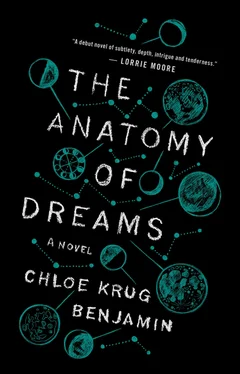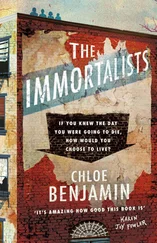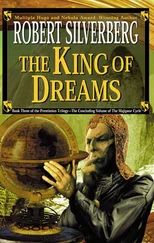“Listen, honey, nobody’s laughing,” said my mother.
“But I have what every college graduate wants,” I said. “A place to stay, a steady income, a job with one of the biggest researchers in my field. Besides, it’s Mr. Keller. You guys love Mr. Keller.”
“I wouldn’t say we love him,” said my father. “We like him just fine. But we like the idea of you staying in school a lot more.”
When Gabe returned, rubbing vigorously at his head with a towel, I was sitting on the bunk bed that was mine for the summer. The room had eight bunks in all, so we called it the Bunk Room. It had been created to accommodate larger groups of visiting researchers, but now Keller used the room to house a few assistants at a time, which meant that most of the beds remained empty. The compound’s original bedrooms functioned as guest rooms for people moneyed enough to come to the Vineyard for consultations and training sessions. Keller couldn’t perform the sleep assessments that we would later do in Fort Bragg and Madison—the compound didn’t have the equipment—but he often led seminars and retreats on lucid dreaming.
The people who came to these workshops weren’t patients; their sleep was entirely normal. Lured by the novelty of lucid dreaming and the spectacular promises made by Keller’s promotional materials ( WORLD SIMULATION , read one pamphlet: Just as a flight simulator enables people to safely fly, lucid dreaming can allow you to experience any imaginable world ), they came in droves on weekends: coiffed East Coast housewives, UMass undergrads in Teva sandals, eccentric elderly couples, even the rare celebrity. Itching at the limits of their own lives, they longed to try on new worlds like T-shirts, to slip easily into their fantasies and discard them before the plane ride home.
Did they do it? It was difficult to tell. There were always a few who left dissatisfied, Gabe said, but many people had been coming for years. Each month, we received testimonials: For me, learning the truth of my feelings, however painful, has opened me to my heart and to my capacity to know love , wrote Juanita Diaz, fifty-six, from Florida. And from John Simpson, thirty-four, an Afghanistan veteran from Colorado: I know that I can change a frightening situation in a lucid dream, so I don’t panic or get scared. And the strange thing is that in waking life I don’t run away either anymore. People think I’ve changed through the years, but the fact is that this is the real me coming out .
Later that summer, we watched as a seminar group napped on blue mats spaced throughout the living room. Gabe and I were standing on the beach, fifty yards from the house, but we could see through the room’s French doors. Inside, twelve adults lay curled like fetuses, or like the pink shrimp that sometimes washed up onto the beach. Keller used yogic breathing and Eastern meditation techniques to help his guests nap during the day—it was easier and less expensive than hosting an overnight study—but I still wondered if any of them were faking it. Keller himself sat a small table, making longhand notes on one of his yellow pads as he scanned the sleepers. Beside each mat, there was a mini notebook and pen; to enhance dream recall—the first step in lucid dreaming—each patient would be asked to write down whatever they remembered as soon as the alarm went off.
“So you believe this stuff?” I asked Gabe. The ocean slid over my feet, frothy and white as steamed milk, and I wriggled my toes into the sand.
“Of course.”
He picked up a piece of driftwood and chucked it into the spray. I squinted at the living room. The adults looked eerie: coiled into themselves and vulnerable with belief as Keller watched from his post in the corner. How invested could he be in these workshops, I wondered, in people he might only see once? That evening, after all the guests had left, I was rolling up the blue mats in the living room when I came across a stack of receipts. Keller had left them on the round table where he’d been sitting, and each one showed a charge of $425.
It was a four-hour workshop with a break for lunch—local lobster rolls, tasting mostly of mayonnaise, which Keller ordered by the trough. I did the math: slightly over $100 per hour—certainly less than the hourly rate of most psychologists. Still, Keller’s workshops weren’t therapy sessions, not exactly; for at least one of those hours, he was watching them sleep. Something about it didn’t seem right. But it was true, I reminded myself, that Keller was in need of funding, and nobody expected him to give his research away for free.
I didn’t ask him about it. As the summer went on, I would unlearn some of the nervousness I felt around Keller—a holdover from high school—but it was acute in the beginning. Though he was gone the weekend we arrived, it felt like he was right there with us. All through the house, discreet, typed signs hung from doorknobs or delicate nails. PLEASE DO NOT TOUCH was suspended beneath a framed handkerchief, the fabric yellowed and embroidered with a tiny C.G.J. (Carl Jung’s, Gabe told me, though he didn’t know how Keller had acquired it). DOOR CLOSED WHEN IN SESSION fluttered from the doorknobs down the hall. We knew there were no sessions when Keller wasn’t there, but neither one of us ever tried to open them.
What struck me most of all, that first weekend, was how hard Gabe worked. He woke before dawn and spent the early hours reading in a rocking chair that looked out over the back porch. When I fumbled out of bed around eight or nine, I found him entirely absorbed: his back bent over the pages, a pen in hand, glasses pushed up on the bridge of his nose. I couldn’t help but follow suit. Keller had assigned me a tall stack of thick, pungent books, the pages yellowed and tissue-soft. There were the seminal texts by Freud and Jung, along with more recent research on a range of sleep skills and disorders: Robert Stickgold’s Sleep and Brain Plasticity , Rosalind Cartwright’s The Twenty-Four Hour Mind , Trauma and Dreams by Deirdre Barrett, and Stephen LaBerge’s full canon on lucid dreaming. Then there were the studies: academic papers with minuscule print and references so obscure that each one sent me on a fact-finding goose chase. In this way I slowly spun myself a web of knowledge, painstakingly linking one idea to the next, my purview widening strand by strand.
All this didn’t even include the ancillary texts. Keller also left me a pile of photocopied nursery rhymes, fairy tales, and biblical passages. A note was paper-clipped on top: Consider the cultural role that night has played throughout history .
“Sure thing,” I muttered, staring at the two-inch stack. “What does he want, an essay?”
I expected Gabe to fire off a snarky comment, but he only smiled.
“It’s interesting,” he said. “You’ll see.”
He was right. After a morning spent with the Journal of Experimental Psychology: Human Perception and Performance , this stuff was practically a guilty pleasure, as entrancing as it was unsettling. The Bible spoke of the lunacy that consumed those who worshipped the moon over God. But I was most disturbed by the nursery rhymes; the fact that these poems were written for children belied their currents of temptation and darkness:
Boys and girls,
rise from your beds
and join the moon
above your heads.
Leave your sleep
and heed the call
out the door
and o’er the wall.
The wind awaits,
the sky so bright:
come and play
all through the night.
We felt Keller’s presence in the Bunk Room, too. Gabe and I slept like guests in a hostel, politely compartmentalizing the shared space. It wasn’t that I’d expected us to fall all over each other as soon as we got a minute alone, but this civil distance still hurt. Hadn’t Gabe suggested he’d recruited me in part because he felt something for me, something more than friendship, or had I been wrong? And if I had been wrong, then what was I doing here? Sure, I had also been tempted by the job security and the extraordinary opportunity, but it was clear to me now: I had come for Gabe. It was as if no time had passed at all, and I was sixteen again, excruciatingly aware of our bodies in space. When he left the room, my heart relaxed like the muscle it was, and when he came close to me—both of us chopping vegetables by the kitchen sink, our elbows inches apart—the space between us seemed to glow. We ate dinner together—bachelor’s pasta sauces and kitchen sink salads—but even then, our topics were safe; whatever tunnel had opened up between us during our conversation in Berkeley seemed to have sealed off again.
Читать дальше












